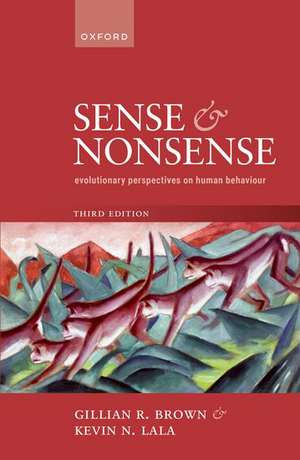Sense and Nonsense: Evolutionary Perspectives on Human Behaviour
Autor Gillian R. Brown, Kevin N. Lalaen Limba Engleză Paperback – 13 dec 2024
Preț: 247.46 lei
Preț vechi: 306.82 lei
-19% Nou
Puncte Express: 371
Preț estimativ în valută:
47.35€ • 51.60$ • 39.90£
47.35€ • 51.60$ • 39.90£
Carte disponibilă
Livrare economică 22-28 martie
Livrare express 18-22 martie pentru 92.20 lei
Preluare comenzi: 021 569.72.76
Specificații
ISBN-13: 9780198908203
ISBN-10: 0198908202
Pagini: 288
Dimensiuni: 155 x 233 x 15 mm
Greutate: 0.46 kg
Ediția:3
Editura: OUP OXFORD
Colecția OUP Oxford
Locul publicării:Oxford, United Kingdom
ISBN-10: 0198908202
Pagini: 288
Dimensiuni: 155 x 233 x 15 mm
Greutate: 0.46 kg
Ediția:3
Editura: OUP OXFORD
Colecția OUP Oxford
Locul publicării:Oxford, United Kingdom
Recenzii
Lucid and balanced, Sense and Nonsense will hopefully reach a broad audience.
Sense and Nonsense is the go-to book for anyone interested in how researchers have used evolutionary theory to explain human behaviour, psychology, society and culture. Brown and Lala expertly and accessibly guide readers through the controversial sociobiology debates of the 1970s, to the emergence of present-day fields such as evolutionary psychology and cultural evolution. They use up-to-date empirical case studies and highlight areas of genuine disagreement and discussion. I highly recommend it for anyone interested in or studying the human evolutionary sciences.
Sense and Nonsense provides a clear and concise introduction to the human evolutionary behavioural sciences. Its balanced approach, covering all sub-disciplines in the field, make it an ideal textbook for undergraduate and postgraduate courses, as well as a useful read for those already working in the discipline. Its engaging writing style will also appeal to anyone who wants to understand why humans do the things we do, given that we cannot wholly understand human behaviour without an evolutionary perspective. One of its most valuable features is the inclusion of both historical perspectives and critical reflections on the discipline. Readers will come away from the book armed with the information they need to form their own opinions on the rapidly growing, but often controversial, field of evolutionary approaches to human behaviour.
Understanding the evolutionary roots of the behavior of humans and other animals is one of the highest profile scientific projects of our times, with pitfalls and controversies in proportion to the scope of its aspirations. In this third edition of their classic volume, Brown and Lala provide us with a ringside seat to debates in this ever-evolving field, merging historical analysis with up-to-the-minute insights about the present and future of the discipline. Sense and Nonsense is the ultimate insider's guide to the history of one of our most ambitious attempts to understand ourselves and our place on the planet.
Sense and Nonsense is the go-to book for anyone interested in how researchers have used evolutionary theory to explain human behaviour, psychology, society and culture. Brown and Lala expertly and accessibly guide readers through the controversial sociobiology debates of the 1970s, to the emergence of present-day fields such as evolutionary psychology and cultural evolution. They use up-to-date empirical case studies and highlight areas of genuine disagreement and discussion. I highly recommend it for anyone interested in or studying the human evolutionary sciences.
Sense and Nonsense provides a clear and concise introduction to the human evolutionary behavioural sciences. Its balanced approach, covering all sub-disciplines in the field, make it an ideal textbook for undergraduate and postgraduate courses, as well as a useful read for those already working in the discipline. Its engaging writing style will also appeal to anyone who wants to understand why humans do the things we do, given that we cannot wholly understand human behaviour without an evolutionary perspective. One of its most valuable features is the inclusion of both historical perspectives and critical reflections on the discipline. Readers will come away from the book armed with the information they need to form their own opinions on the rapidly growing, but often controversial, field of evolutionary approaches to human behaviour.
Understanding the evolutionary roots of the behavior of humans and other animals is one of the highest profile scientific projects of our times, with pitfalls and controversies in proportion to the scope of its aspirations. In this third edition of their classic volume, Brown and Lala provide us with a ringside seat to debates in this ever-evolving field, merging historical analysis with up-to-the-minute insights about the present and future of the discipline. Sense and Nonsense is the ultimate insider's guide to the history of one of our most ambitious attempts to understand ourselves and our place on the planet.
Notă biografică
Gillian R. Brown is a Professor in the School of Psychology & Neuroscience at the University of St Andrews, UK. Her research focuses on sex/gender differences in the behaviour and cognition of mammals, including humans, which she has studied from neuroendocrine, developmental and evolutionary perspectives. Research topics have included infant and adolescent behavioural development, parental investment, and mating strategies. She has formerly been Vice-President of the European Human Behaviour and Evolution Association and Equality, Diversity & Inclusion Faculty Lead (Science & Medicine) for the University of St Andrews.Kevin N. Lala (formerly Laland) is Professor of Behavioural and Evolutionary Biology at the University of St Andrews, UK. His research encompasses a range of topics related to animal behaviour and evolution, particularly social learning, gene-culture coevolution, and niche construction. He has published 12 books and over 300 articles on these topics and is an elected Fellow of the Royal Society of Edinburgh and Royal Society of Biology. He is also a former President of both the European Human Behaviour and Evolution Association and the Cultural Evolution Society.
